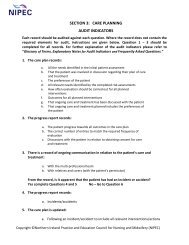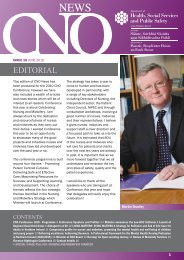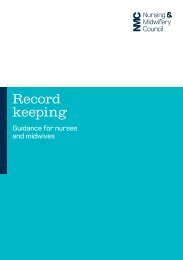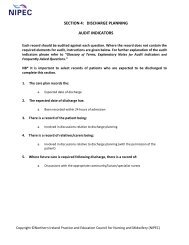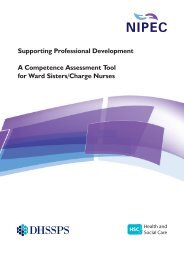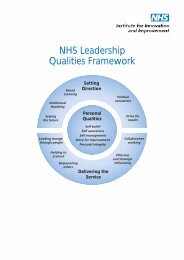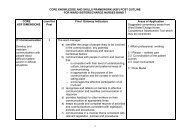CNO Newsletter March 2011 - Department of Health, Social ...
CNO Newsletter March 2011 - Department of Health, Social ...
CNO Newsletter March 2011 - Department of Health, Social ...
You also want an ePaper? Increase the reach of your titles
YUMPU automatically turns print PDFs into web optimized ePapers that Google loves.
NEWSInfection prevention and controlhas been a key aspect <strong>of</strong> clinicalpractice for many years and hastraditionally been viewed as theresponsibility <strong>of</strong> a small number<strong>of</strong> designated individuals based inthe acute healthcare sector. As thelandscape <strong>of</strong> healthcare deliveryhas evolved and prevention <strong>of</strong>healthcare associated infectionhas become more <strong>of</strong> a priority forhealth and social care providers ithas become clear that the role <strong>of</strong>infection prevention and controlpractitioners needs to develop inresponse.Practitioners in this field now comefrom a wide range <strong>of</strong> pr<strong>of</strong>essionsand occupations, bringing skillsand knowledge from their ownspheres <strong>of</strong> practice. However, theystill require key competences toenable them to practise safelyand with clinical credibility in theinfection prevention and controlarena.In response to this need, theInfection Prevention Society (IPS)has recently produced a set <strong>of</strong>core competences designed toenhance the practice <strong>of</strong> staffworking in the field <strong>of</strong> infectionprevention and control. They havebeen developed in partnership withall four UK governments, Skills for<strong>Health</strong> and the Council <strong>of</strong> Deans,chaired by the Chief NursingOfficer for Scotland, Ros Moore.The competency framework isbased on the four domains withinthe Advanced Practitioner toolkit(Scottish Government, 2008) forModernising Nursing Careers:• Clinical Practice (6competences)• Education (4 competences)• Research (3 competences)Journal <strong>of</strong>Infection PreventionOutcome competences for practitioners in infection prevention and controlInfection Prevention Society and Competency Steering GroupLead Coordinator: E Burnettwww.ips.uk.netFormerly the British Journal <strong>of</strong> Infection ControlOutcomeCompetencesfor Practitionersin InfectionPrevention andControlJIP-395797.indd i 1/17/<strong>2011</strong> 1:10:57 PM• Leadership and Management (4competences)Each competence comprises• A competence statement• Performance indicators alignedto each statement• Generic and specific knowledgeunderstanding and skillsneeded to meet the competence• Alignment to Skills for <strong>Health</strong>,National OccupationalStandards and the NHSKnowledge and SkillsFramework (Skills for <strong>Health</strong>2010; <strong>Department</strong> <strong>of</strong> <strong>Health</strong>2004)The competences may be used ina variety <strong>of</strong> ways and by a range<strong>of</strong> pr<strong>of</strong>essionals from recentlyappointed infection prevention andcontrol practitioners, through tomanagers <strong>of</strong> health care services,educational commissioners andproviders as well as practitionersworking at or near advanced level<strong>of</strong> practice. Organisations whichare looking to develop staff withthe expertise to drive forwardthe infection prevention andcontrol agenda may also find thisdocument a useful tool.The competency framework isavailable in both electronic formand hard copy in the <strong>March</strong>edition <strong>of</strong> the Journal <strong>of</strong> InfectionPrevention. Electronic access isfree to all and can be located onthe IPS website http://www.ips.uk.netNorthern Ireland have been fullyengaged in this initiative throughits Infection Prevention Societymembers and with full support<strong>of</strong> the DHSSPS and the ChiefNursing Officer. In 2009 the<strong>Department</strong> commissioned NIPECto carry out a review <strong>of</strong> InfectionPrevention and Control Training inNorthern Ireland, and one <strong>of</strong> therecommendations is to, “determinethe training needs <strong>of</strong> IPC specialistpractitioners, taking into accountthe Infection Prevention NursesAssociation Core Competencies forPractitioners in Infection Preventionand Control (ICNA, 2004).”These competences will providea framework for the regionaldevelopment and commissioning<strong>of</strong> Infection Prevention and Controleducation programmes to be led bythe Public <strong>Health</strong> Agency.Grateful thanks to Emma Burnett,Lead Co-ordinator, IPS Educationand Pr<strong>of</strong>essional DevelopmentCommittee, Lecturer andResearcher, University <strong>of</strong> DundeeSchool <strong>of</strong> Nursing and Midwifery.18



